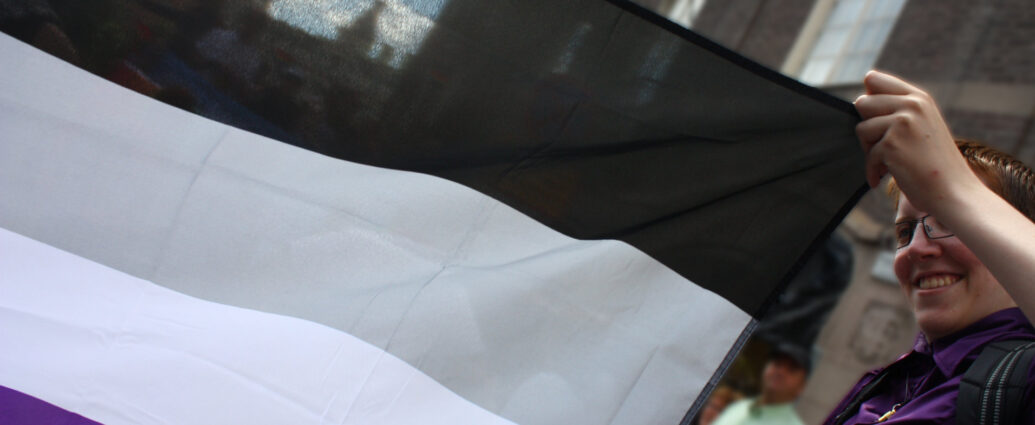Amelia Hopkinson
This article features statistics from the Ace In The UK Report (2023), the result of the Stonewall x Yasmin Benoit Ace Project, launched in 2022, to help build a better picture of the lives and experiences of those in the Ace community.
Sex. It’s everywhere. Teaching all things sex and pleasure is our mission at ‘Let Me Sexplain’ — however, it’s not everyone’s cup of tea.
So, What Is Asexuality?
Asexuality most often refers to the lack of sexual attraction to others or a low interest and desire for sexual activity.
A non-asexual person might see someone that they are interested in, think about wanting to have sex with them and then become physically turned on. Generally, someone who is asexual won’t be turned on by someone’s appearance or body.
However, asexuality is an umbrella term. As asexuality describes a spectrum, there is not one single way to define it.
“Asexuality is still a medicalised orientation which is not recognised under the 2010 Equality Act.”
“Everyone’s experience with asexuality is different,” Zoe, who identifies as ace, tells Empoword. “This can be embraced when people have open and non-judgemental conversations.”
@rainbowhistoryclass Asexuality is one hell of a spectrum! @Rudy Jean Rigg is RHC’s Ace icon, so any questions, ask away! #pridemonth #queer #queertok #aroace #asexual #greyace #asexuality #asexualpride #lgbtq #lgbtqia
Common Terms
Let’s break down some standard terms often used by people in the Ace community. Many use these terms to identify themselves or their approach to sex.
Grey-A
Michael from The Asexual Visibility and Education Network (AVEN) explains: “What it comes down to is that sexuality is not black and white. Some people call themselves grey-asexual or grey-A, meaning they might have a sex drive sometimes, but not often, or only at low intensity.”
These are three main categories of grey asexuality:
Sex-neutral
People who aren’t repulsed by sex, however they might not actively seek it out. If you are sex-neutral, you may still have sex if you are in a relationship, for example, and want to please your partner.
Sex-repulsed
People who are repulsed by or utterly disinterested in the concept of sex.
Sex-positive
Someone who identifies as asexual but will still have sex for pleasure.
“I think that the biggest misconception I’ve faced is that a lot of people think ace folks don’t have sex or don’t ever want to,” B. tells Empoword.
“For some folks, that’s true, and sometimes it’s true for me, too, but I’m still a person. I still enjoy sex. It’s just not a drive for me, and I’d be okay if it were off the table.”
Demisexual
People who only experience sexual attraction once they have formed a strong emotional connection with another person.
Queerplatonic
A non-romantic relationship with an emotional connection deemed more intense than a friendship.
Aromantic
People who experience little or no romantic attraction and are satisfied with non-romantic relationships and close friendships.
Romantic Orientations
People in the Ace community often use hetero-, homo-, bi-, and pan- in front of the word romantic to describe who they experience romantic attraction to.
https://www.tiktok.com/@netflix/video/6870080600582229254?amp%3Bamp%3Bsender_device=pc&%3Bamp%3Bweb_id=7328356266995598881&is_from_webapp=1
Notable Asexual Representation
The England and Wales Census 2021 recorded that 28,000 individuals identified themselves as asexual. However, more comprehensive research has suggested that the population may be higher — between 1 per cent and 2 per cent of adults. There is a slightly higher representation among young adults.
There has been a gradual rise in UK Google searches for the terms ‘asexual’ and ‘aromantic’ over the last five years.
Representation of the Ace community in the media has a long way to go. However, there have been notable spikes in media stories relating to asexuality, especially around awareness days and when new asexual characters are announced in films and TV series.
There have also been a few notable characters in some pretty mainstream and popular shows! Do any immediately come to mind? Here’s a selection:
- Issac and Tori from Heartstopper (Fun fact: Author Alice Oseman is also Ace)
- Cash from Heartbreak High
- Both O and Florence from Sex Education
- Elijah from Big Mouth
- Todd from Bojack Horseman
Asexual Discrimination
Despite a growth in statistical and media representation, asexuality is still a medicalised orientation which is not recognised under the 2010 Equality Act.
The fact that asexuality is still being medicalised and pathologised is why we need more representation and better understanding of asexuality in both the medical community and wider society. We really should have moved past the medicalisation of LGBTQIA+ identities. https://t.co/IaVygWPi2u
— WelshAce 🏴🏳️🌈 (@CymruAce) July 31, 2022
The National LGBT Survey (2018) also found that asexual people are 10 per cent more likely to be offered or to undergo conversion therapy than other orientations.
All identities in the LGBTQ+ community should be recognised under the act, and conversion therapy needs to be banned worldwide.
“There’s so much more to a person than their sexuality and being on the asexual spectrum doesn’t make someone ‘broken’ or ‘wrong’. We just experience things a little differently from other people,” says Zoe.
READ NEXT:
-
UK HEALTHCARE PROFESSIONALS TOLD NOT TO REPORT ILLEGAL ABORTIONS
-
LET ME SEXPLAIN: CONTRACEPTION
-
CAN TAYLOR SWIFT SWAY THE US ELECTION OUTCOME?
Featured image courtesy of trollhare via Flickr. No changes have been made to this image. Image license found here.

